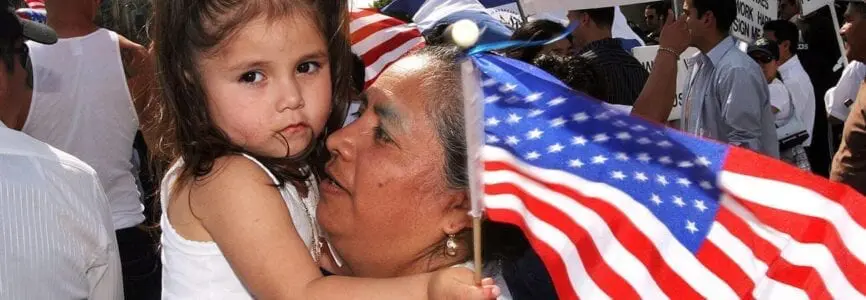Bioethics Forum Essay
Migrants’ Lives, Immigration Policy, and Ethics Work
The Russian poet Anna Akhmatova was a mother separated from her child by a state policy of terror. During the 1930s, she and other mothers would gather outside a Leningrad prison, desperate for information. One day, after 17 months of “waiting in prison queues,” another woman whispered to her, “‘Could one ever describe this?’ And I answered, ‘I can.’” Akhmatova’s poem cycle Requiem reflects on the anguish of family separation from the perspective of a parent, who “stood for three hundred hours/And no-one slid open the bolt.”
The U.S. Justice Department’s April decision to jail and criminally prosecute adult migrants apprehended after crossing the U.S.-Mexico border and separate children from parents, explained here, and here in visual form, has produced its own narratives of terror. The most horrifying thus far is the recording of the voices of children in a Border Patrol detention facility, pleading for their parents. In the recording obtained by ProPublica, a Salvadoran girl is determined to shape her own story, to “describe this.” She has memorized her aunt’s phone number, and begs a consular official to make a phone call. Any adult who has been responsible for a young child would recognize how this little girl’s mother has prepared her for a separation, by teaching her crucial information and explaining how to find an adult to trust.
ProPublica also spoke with the child’s aunt, who said, “‘Imagine getting a call from your 6-year-old niece. She’s crying and begging me to go get her. She says, ‘I promise I’ll behave, but please get me out of here. I’m all alone.’” The listener’s hope that this child had found a way out of her terrifying situation was dashed by the reality of her aunt and cousin, whose years-long process of seeking asylum has been jeopardized by the recent Justice Department ruling that people fleeing gang or domestic violence would no longer qualify for protection. They, too, are terrified.
In the past six weeks, 2,342 children have been separated from their parents; as yet it is unclear how the June 20 executive order ending family separation will be implemented. Journalists and immigrant rights advocates have done heroic work on the ground, describing injustice and working for justice. Attorneys have had to swiftly adapt ethics policies and related protocols designed for interviewing teenagers. As one attorney explained to a journalist: “Our duty as attorneys is to represent the child’s express wishes. Sometimes, when they are really young, it’s difficult to ascertain those wishes . . . because they can’t express as much…It is very emotional on me, and everyone else on staff. It is very hard to see very young children . . . .I feel like if we don’t do this, who else is going to? As upsetting as it is, we have to do it.”
What should the field of bioethics do, beyond lending our names, as citizens and professionals, to the outcry? Here are three recommendations for our field, reflecting the continuing importance of migration as a phenomenon shaping our world.
- In clinical teaching and learning, frame and analyze challenges concerning care for migrants as problems of justice.
Providing good care to migrants whose legal status is uncertain or threatened is often experienced as an ethically fraught aspect of practice. While acknowledging practitioner moral distress, bioethics education should aim for a higher standard of basic knowledge concerning the situation of migrants in a society. Research insights on how a system’s leaders and administrators influence professional behavior concerning a stigmatized population should be part of this analysis.
- In teaching and learning, organizational ethics, and public service, aim to understand and reflect the local implications of national policy.
Worldwide, most migrants live in cities; most immigrants to the U.S. live in just 20 metropolitan areas. Professionals in safety-net health care in these cities are likely to encounter patients whose lives are shaped by a nation’s immigration enforcement policies. Professionals who work near immigrant detention facilities will also encounter national issues locally. Learning from local colleagues with expertise in immigration law and immigrant health advocacy contributes new knowledge to our field. Our vocabulary can help these colleagues reflect on their own ethical challenges.
- In ethical theory, account for the migrant and her children.
Theories of justice that specify duties of wealthier to poorer regions concerning health-related resource allocation and development may not fully account for the relationship between aid and migration, or speak to the status of migrants. Bioethicists interested in the global dimensions of public health can contribute to theory, research, and policy recommendations concerning duties to migrants, and to their children.
Nancy Berlinger is a research scholar at The Hastings Center. She recently completed an academic writing residency at the Bellagio Center of the Rockefeller Foundation for a book project on migrants as social citizens. She codirects The Hastings Center’s Undocumented Patients project, a knowledge hub on health care access for unauthorized migrants and mixed status families in the United States. Rachel Zacharias, a project manager and research assistant at The Hastings Center, provided background research.
Image: Shutterstock
45% of The Hastings Center’s work is supported by individual donors like you.
Support our work.














We need to do more to stop this outrage. Letter writing, texting, calling our representatives and senators. Being at group protests. Speaking out. As ethicists, we can speak about this outrage in a non-partisan, measured way but clearly outline the moral outrage raised by the inhumane treatment of children and their parents and refugees from horrendous social situations often created, in part, by the economic and political policies of those governments doing the inhumane treatment.